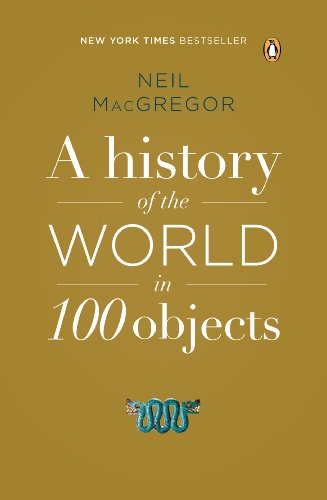
"An enthralling and profoundly humane book that every civilized person should read."
--The Wall Street Journal
The blockbuster New York Times bestseller and the companion volume to the wildly popular radio series
When did people first start to wear jewelry or play music? When were cows domesticated, and why do we feed their milk to our children? Where were the first cities, and what made them succeed? Who developed math--or invented money?
The history of humanity is one of invention and innovation, as we have continually created new things to use, to admire, or leave our mark on the world. In this groundbreaking book, Neil MacGregor turns to objects that previous civilizations have left behind to paint a portrait of mankind's evolution, focusing on unexpected turning points.
Beginning with a chopping tool from the Olduvai Gorge in Africa and ending with a recent innovation that is transforming the way we power our world, he urges us to see history as a kaleidoscope--shifting, interconnected, constantly surprising. A landmark bestseller, A History of the World in 100 Objects is one f the most unusual and engrossing history books to be published in years.
“None could have imagined quite how the radio series would permeate the national consciousness. Well over 12.5 million podcasts have been downloaded since the first programme and more than 550 museums around Britain have launched similar series featuring local history. . . . MacGregor’s voice comes through as distinctively as it did on radio and his arguments about the interconnectedness of disparate societies through the ages are all the stronger for the detail afforded by extra space. A book to savour and start over.”
—The Economist
From the Trade Paperback edition.Amazon Best Books of the Month, November 2011: In A History of the World in 100 Objects, Neal MacGregor, director of the British Museum, takes readers on a tour of the world by way of its material goods. From everyday items such as pots, utensils, and money to valuables such as art and jewelry, MacGregor shows that the things humans have left behind are often as rich and informative as written texts. Whether it’s a strange and unique object like a throne made of rifles from Mozambique or a medieval German crystal, or a familiar one like a sculpture of the head of Augustus or Hokusai's painting The Great Wave, MacGregor skillfully weaves each one into the fabric of the society that it came from. In that sense, the book is much more than a museum catalog: it's a hundred keyhole views into a hundred different societies from around the world and throughout history."An enthralling and profoundly humane book that every civilized person should read."
--The Wall Street Journal
The blockbuster New York Times bestseller and the companion volume to the wildly popular radio series
When did people first start to wear jewelry or play music? When were cows domesticated, and why do we feed their milk to our children? Where were the first cities, and what made them succeed? Who developed math--or invented money?
The history of humanity is one of invention and innovation, as we have continually created new things to use, to admire, or leave our mark on the world. In this groundbreaking book, Neil MacGregor turns to objects that previous civilizations have left behind to paint a portrait of mankind's evolution, focusing on unexpected turning points.
Beginning with a chopping tool from the Olduvai Gorge in Africa and ending with a recent innovation that is transforming the way we power our world, he urges us to see history as a kaleidoscope--shifting, interconnected, constantly surprising. A landmark bestseller, A History of the World in 100 Objects is one f the most unusual and engrossing history books to be published in years.
“None could have imagined quite how the radio series would permeate the national consciousness. Well over 12.5 million podcasts have been downloaded since the first programme and more than 550 museums around Britain have launched similar series featuring local history. . . . MacGregor’s voice comes through as distinctively as it did on radio and his arguments about the interconnectedness of disparate societies through the ages are all the stronger for the detail afforded by extra space. A book to savour and start over.”
—The Economist
From the Trade Paperback edition. .
Read A History of the World in 100 Objects complete books online for free. Reading A History of the World in 100 Objects full free books online without downloading.
Looking up to the full article E-Books free download? Here you can read.
